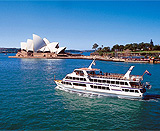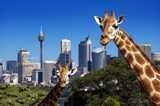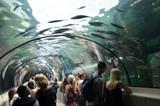
sydney.com.au
Est 1994, Sydney's oldest tourism website


ESSENTIAL INFORMATION
Arriving in Sydney by air
The Kingsford Smith Airport is the main international and domestic airport. It is about 10 kilometres (6 miles) south-west of the Central Business District and Sydney Harbour and is serviced by train, private coach service, shuttle buses and taxis (cabs).
- Private coach to your hotel
- Private car to hotel or any address in Sydney
- Airport train (13-minutes to Central Station, the main railway station for interstate, intrastate and suburban train services.)
- Shuttle buses also operate from the various airport terminals.
Arriving in Sydney by train
The main railway station for interstate and intrastate arrivals and departures is Central Railway Station, on the western fringe of the CBD. It is connected to the suburban rail network.
Getting around the city
The easiest way to get around the city is either by bus or via the underground rail network, which is known as the "City Circle". The City Circle service operates through a series of subway stations that form a loop from Central Station to Circular Quay. The City Circle rail service allows visitors to disembark at subway stations near Sydney's main attractions, including Circular Quay and Sydney Cove, Opera House, The Rocks and Sydney Tower.
See the Getting Around section for more information
Public transport
Sydney has a large and well run Government public transport system. Web sites offer extensive information on:
Public transport tickets
the Sydney transport authority has moved away from issuing paper tickets (with rare exceptions, such as the Manly ferry) and has introduced a public transport ticketing system called "Opal cards". The Opal card is a free smartcard ticket that you load value onto and keep for travel on all public transport in Sydney, Blue Mountains, Central Coast, Hunter, Illawarra and Southern Highlands. When you tap on at an Opal card reader to start your journey, and tap off at the end of your journey, the system will automatically calculate your fare and deduct it from the value stored on your Opal card. Don't forget, you must tap off when you complete a journey on all transport services except for the Manly Ferry Service.
You can get an Opal card at newsagencies, convenience stores, kiosks and other points in the CBD and surrounding areas (see here for specific retailers and locations).
You can also get Opal cards online.
For full information about Opal cards and the ticketing system, click here
.
Banking hours
Generally 9.30am-4pm Monday to Thursday, and 9.30am-5pm Friday, but some banks offer extended hours and some are open on Saturday mornings. Travellers cheques are widely accepted, as are major credit cards VISA, Mastercard and (to a lesser extent) AMEX and Diners Card. Most banks will engage in foreign currency exchange.
Weather forecast & climate
For Sydney weather forecasts, temperatures, climate details, monthly mean temperatures, rainfall and sunshine information, click here.
Currency
Dollars and cents. Notes: $5, $10, $20, $50 and $100 bills. Coins: 5 cents, 10 cents, 20 cents, 50 cents, $1 and $2. The Australia dollar is floated on the world currency market and tends to fluctuate between 70 and 78 US cents.
Eating out
Sydney has an abundance of cafes and restaurant precincts featuring a huge diversity of Australian and ethnic cuisines. These precincts are in and near the Central Business District and in popular tourist locations. The diversity of these eateries makes Sydney one of the world's great food destinations. Food preparation laws are strict in Australia so generally there is no problem in eating out. Prices vary from expensive in upmarket restaurants near the Opera House to cheap in Newtown and Glebe Point Road.
Health
Sydney, like most parts of Australia, presents no real health risks for foreign visitors. Tap water is good, restaurants and eating places are required by law to maintain a high standard of food preparation, and the city is generally clean. Smog is less of a problem than with cities such as London, Hong Kong and Bangkok, but is still quite high.
Exposure to the sun can be a problem for those who are fair-skinned. Also, those with little experience in swimming in the surf should be cautious when swimming at Sydney's famous surf beaches, Bondi and Manly, and should always swim between the warning flags erected by lifeguards. Medical costs in Australia are not exhorbitant like in the United States and Europe, but travel insurance is still recommended.
Electricity
Australia runs on 240V, 50hz current. Make sure the transformers, chargers, and electronic gear you bring with you can handle 240v. Plugs in Australia are different from those in the UK, USA, Europe, Asia and South-east Asia. Plug adaptors can easily be purchased at electronic stores. If you need to purchase a transformer for your appliance, it might be advisable to buy it before you depart for Australia.
The plugs used here are different from those used in the UK and USA. Plug adaptors are pretty easy to purchase here at electronic stores.
Lockers/storage
A number of Locker and/or Luggage storage facilities are located around Sydney. The plugs used here are different from those used in the UK and USA. Plug adaptors are pretty easy to purchase here at electronic stores.
Visitors' information centres
Sydney Visitor Centres make planning your holiday easy. Located at the corner of Argyle and Playfair Streets in The Rocks, it offers one-stop-shop convenience for visitor information, providing comprehensive details on tours, accommodation and entertainment, in and around Sydney at the time of your visit. It is open from 9.30am to 5.30pm daily except Christmas Day and Good Friday.
The New South Wales Travel Centre is situated at 11 York Street, just above Wynyard Station. It is open from 9am to 5pm Monday to Friday and 9am to 1pm Saturday.
The CitiRail Host Centre is opposite No. 5 jetty at Circular Quay. It is open from 9am to 5pm, seven days a week.
There is an information kiosk in Martin Place, near Castlereagh Street, that is open 9am to 5pm Monday to Friday.
There are information booths at the top of Sydney Tower and at Darling Harbour, both open seven days a week.
The plugs used here are different from those used in the UK and USA. Plug adaptors are pretty easy to purchase here at electronic stores.
City post offices
Sydney GPO Post Shop
1 Martin Place
phone 13 13 18
Opening hours:
Mon-Fri 8:15am - 5:30pm
Saturday 10:00am - 2:00pm
Sunday - closed
Australia Square Post Shop
264a-278 George Street
phone 13 13 18
Opening hours:
Monday 9:00am - 5:00pm
Tue - Fri 8:30am - 5:00pm.
Sat & Sun - closed
QVB Market Street Post Office
44 Market Street
phone
13 13 18
Opening hours:
Mon-Fri 8:30am - 5:00pm
Saturday 9:30am - 1:00pm
Sunday - closed
Sydney Parliament House LPO
6 Macquarie Street
phone 9230 2297
Opening hours:
Mon-Fri 9:00am - 5:00pm
Sat & Sun - closed
Royal Exchange Post Shop
38-40 Pitt Street
phone 13 13 18
Opening hours:
Mon-Fri 9:00am - 5:00pm
Sat & Sun - closed
Shopping hours
Generally 9am-5pm, Monday to Friday; 9am-9pm, Thursday; 8.30am-4pm, Saturday. Shops in tourist areas may be open on Sundays.
Public holidays in Sydney in 2016
| 2016 | |
| New Years Day | Friday, 01 January |
| Australia Day | Tuesday, 26 January |
| Good Friday | Friday, 25 March |
| Easter Saturday | Saturday, 26 March |
| Easter Sunday | Sunday, 27 March |
| Easter Monday | Monday, 28 March |
| Anzac Day | Monday, 25 April |
| Queen's Birthday | Monday, 13 June |
| Bank Holiday | Monday, 01 August (Not State wide) |
| Labour Day | Monday, 03 October |
| Christmas Day | Sunday, 25 December |
| Boxing Day | Monday, 26 December |
| Additional Day | Tuesday, 27 December |
School Term & Holiday Dates for Sydney 2016
Essentials
- Electricity voltage: 240.
- Units of measure: metric.
- Public phones: 50-cent local calls (Sydney metropolitan area).
- Phone directory assistance: 1223 (Sydney area), 1223 (Australia), 1225 (International).
- Phone international dial out prefix code: 0011.
- Coffee: around $4.00 a cup, sometimes less, quite often more in tourist areas.
- Emergency phone number for police, ambulance and fire is 000 (see all emergency contact phone numbers).
- Consulates and embassies
- Whitepages telephone directory online (all states of Australia)
Rail Travel throughout NSW and Australia
Australia has an extensive rail network from Sydney connecting cities within New South Wales and throughout Australia.
From Sydney to Melbourne, Brisbane & Dubbo on The XTP; from Sydney to Canberra, Broken Hill & Tamworth, Moree & Armidale; From Sydney to Adelaide and on to Perth on the Indian Pacific; and other major train networks including The Ghan, The Overland, The Inlander, The Sunlander, The Westlander, The Gulflander and numerous more.
For more information, timetables and fares: Rail Australia
Petrol (gas) in cents/litre
The price of petrol fluctuates wildly in Australia due to shifts in international oil prices. The price can fluctuate from day to dayin the $1.20-$1.50 a litre range.
Tourist Refund Scheme
Overseas tourists can claim a refund of the goods and services tax (GST) and wine equalisation tax (WET) they pay on goods they buy in Australia. The refund only applies to goods that are taken as hand luggage or carried onto an aircraft or ship when visitors leave the country.
For more information on the refund scheme.







